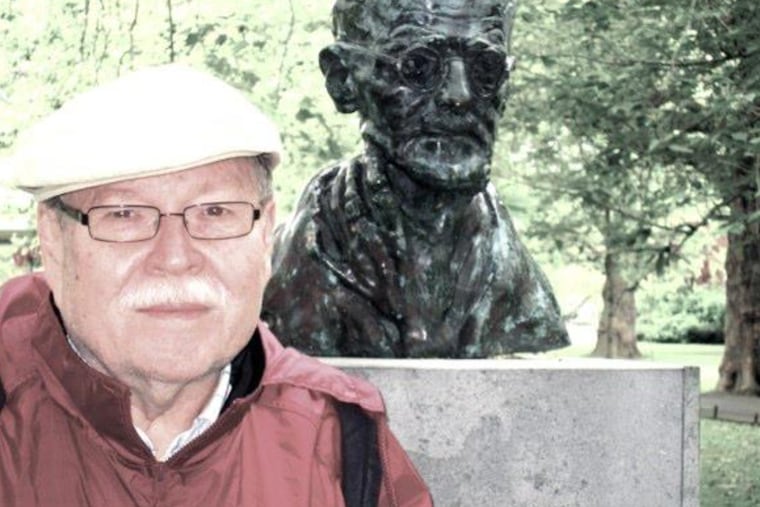Hugh H. Grady Jr., Shakespearean scholar at Arcadia, English professor emeritus, author, and political activist, has died at 74
His wife said he was "always respectful of his students' ability to understand complex ideas," and colleagues said his contributions to the understanding of Shakespeare's canon are immense.

Hugh H. Grady Jr., 74, of Wyndmoor, a preeminent Shakespearean scholar at Arcadia University, English professor emeritus, author and editor, and left-wing political activist, died Sunday, May 8, of acute myeloid leukemia at the Hospital of the University of Pennsylvania.
Beginning in 1987, Dr. Grady taught undergraduate and graduate courses in writing, literature, and contemporary critical theory at Arcadia in Glenside. He was an inspiring teacher and mentor who twice chaired the English department and was recognized around the world as an expert on theoretical and critical approaches to analyzing the works of English playwright and poet William Shakespeare.
Dr. Grady was devoted to the study of poetry and literature of the English Renaissance and had “an emotional engagement with the language,” said his daughter Constance. He published a half dozen well-received monographs about Shakespeare, including Shakespeare’s Dialectic of Hope: From the Political to the Utopian in 2022.
He edited books and other material about Shakespeare and writers of the early modern period, and wrote more than 40 chapters, essays, and articles for scholarly publications. One reviewer wrote about Shakespeare’s Dialectic of Hope: “This book should be required reading for anyone interested in the evolving meanings of Shakespeare’s plays and the legacies of political criticism.”
Michael Dobson, director of the England-based Shakespeare Institute, said Dr. Grady was “a much-loved participant” at conferences and seminars held around the world by the International Shakespeare Association, Renaissance Society of America, Shakespeare Association of America, and other groups. In 2012, he was a keynote speaker at the Contemporary Shakespeare Conference in Hildesheim, Germany.
Curious and collegial, he won Arcadia’s Ellington Beavers Faculty Award for intellectual inquiry in 1990 and 2004, was professor of the year for 2001-02, and was awarded a 2004 summer research stipend from the National Endowment for the Humanities.
When he retired in 2014, school officials noted Dr. Grady’s “dedication to teaching, his extraordinary scholarship in the field of literature, and his years of service to Arcadia.” Dr. Grady said: “I plan an active retirement of continued scholarship, writing, and occasional part-time teaching in the future.” And that’s what he did.
He continued to attend conferences and seminars on Shakespeare, published a book about English poet John Donne in 2017, and, with other retired Arcadia professors, was featured in a 2018 lecture series at Rydal Park retirement community.
Born Oct. 6, 1947, in Savannah, Ga., Dr. Grady graduated from Benedictine Military School and earned a bachelor’s degree in English from Fordham University. He went to Paris for his junior year of college and — witnessing the French demonstrations against capitalism, consumerism, and traditional institutions — later became active in Fordham’s chapter of Students for a Democratic Society and supported left-wing progressive policies for the rest of his life.
He met fellow activist Sue Wells at Fordham. They read poetry to each other, married in 1969 and had daughters Constance and Laura. They went to Houston for the AmeriCorps VISTA national service program after graduation, and he taught high school French and English.
Dr. Grady received a master’s degree in English and a doctorate in comparative literature from the University of Texas at Austin. They lived in Louisville, Ky., and Detroit, and he was immersed in Shakespeare’s iambic pentameter as senior assistant editor for Gale Research publications.
He taught English for two years at Temple University after he and his wife, an English professor at Temple, moved to Germantown in 1985. In a tribute, colleague Barbara Bono, former professor of English at the State University of New York at Buffalo, said Dr. Grady was known for his “generosity, kindness, and warmth toward junior and senior colleagues alike.”
Dr. Grady liked to hike along the Wissahickon Creek and through woods with his family and “talk about the difference between the picturesque and the sublime,” said his daughter Constance. He cheered for the Phillies, played acoustic guitar, encouraged political debates, and never really shed his Georgia drawl.
“He was generous in every sense of the word, especially with his patience and also his wonderful wit,” said his daughter Laura.
He got into yoga later in life, and his family read snippets of Shakespeare’s As You Like It and Henry V to him in his final days. “We talked about everything all the time,” his wife said. “We discussed Paradise Lost as we did the dishes.”
In addition to his wife and daughters, Dr. Grady is survived by two grandchildren, three sisters, and other relatives.
Services were held Sunday, May 15, and Thursday, May 26, and there is a memorial page on Facebook.
Donations in his name may be made to the Leukemia and Lymphoma Society, Donor Services, P.O. Box 22324, New York, N.Y. 10087.